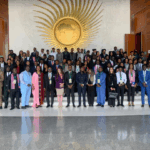
Winner of Ghana’s Most Beautiful 2024 and Founder of EcoGreen Oases Legacy, Queen Nihad Titiaka Oases Ibrahim, delivered an impassioned call for collective African action on climate justice during the 5th Continental Conference of the Federation of African Law Students (FALAS) at the African Union Headquarters in Addis Ababa, Ethiopia.
Speaking to over 200 delegates from 16 countries, she rallied law students, lawyers, and policymakers to “become the conscience of climate accountability” on a continent that contributes less than 4% of global greenhouse-gas emissions yet suffers the most severe droughts, floods, and food insecurity.
“You can have all the money in the world, but if the air you breathe is poisoned, that money is worthless,” she said, drawing applause. “Try holding your breath while counting money and see how long you last.”
Queen Titiaka, who holds a Bachelor of Laws degree, described climate justice as “fairness, accountability, and human dignity; ensuring that those who contribute least to climate change do not suffer the most from its impacts.” Citing the African Development Bank, she noted that climate change already costs Africa between 5% and 15% of GDP annually, undermining hard-won development gains and threatening progress toward the Sustainable Development Goals.
She emphasized that climate justice is not only an environmental concern but also a matter of social and economic equality; one that demands empowering rural women, farmers, and youth with access to education, technology, and finance.
Through her flagship project, Empowering Communities for Climate Action, she and her team have planted 1,000 trees, educated 5,000 students, and trained over 200 women and youth in recycling and upcycling waste materials into useful products. “Each of these acts,” she remarked, “is a seed of justice: a restoration of dignity and hope.”
In her address, she highlighted how climate injustice magnifies existing inequalities, noting that according to the UN Environment Programme, climate shocks push about 11 million Africans into poverty every year, and by 2030 as many as 118 million extremely poor Africans could be exposed to droughts and extreme heat if urgent action is not taken.
Women, she observed, are disproportionately affected, quoting FAO data which shows that women constitute 70 percent of Africa’s agricultural workforce but own less than 20 percent of the land. “Climate injustice deepens inequality because it punishes those who have contributed least, women, youth, and the poor, for the sins of the powerful,” she said.
Queen Titiaka called on African governments to integrate climate justice into national policies and ensure equitable access to climate finance. Despite the continent’s vulnerability, less than 12 percent of global climate finance reaches Africa, and only 39 percent of African nations have fully costed adaptation plans, according to UNFCCC (2024).
She urged leaders to invest in clean energy transitions, citing the International Energy Agency’s finding that over 600 million Africans still lack access to electricity. She further encouraged collaboration between academia, the private sector, and youth-led initiatives to transform “global promises into local progress.”
For individuals, she championed everyday climate-conscious actions; tree planting, reusing materials, supporting sustainable brands, and using one’s voice to demand accountability. “As a law graduate, I see climate justice as both a right and a responsibility; the right to a safe environment and the duty to protect it,” she stated. “As a queen, I see it as legacy: what we plant today must grow into hope for generations to come.”
The FALAS 2025 Conference, which marked the Federation’s 5th anniversary under the theme “Strengthening African Youth Leadership through Ubuntu for a United and Independent Africa,” brought together emerging leaders to deliberate on law, governance, and sustainability.
Queen Titiaka’s address stood out not just for its passion, but for its fusion of data, law, and lived experience; reminding Africa’s youth that the fight for climate justice is both a legal obligation and a moral duty.